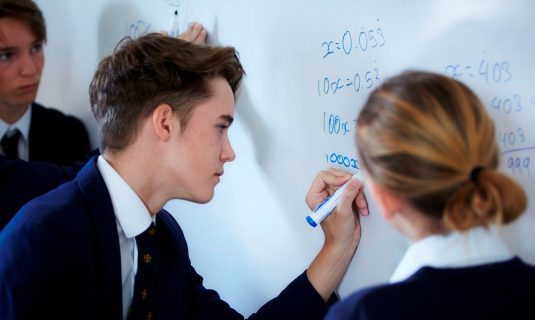Department Representatives Project – Maths
This year Teddies launched the Department Representatives Project as part of Pupil Voice and Action. This project aims to celebrate the work and activities of our many subject areas by nominating pupil representatives for each subject. These representatives from across the Shell, Middle School and Sixth Form met with the Heads of Departments to gather insights into the curriculum and to find out about how new research shapes what is taught in classrooms and the enrichment opportunities each department provides.
met with the Heads of Departments to gather insights into the curriculum and to find out about how new research shapes what is taught in classrooms and the enrichment opportunities each department provides.
Here Justin Liu, Alisha Ali and Milly Tan, the department representatives for Maths, tells us about how the subject is taught at Teddies:
At first glance, Maths can sometimes seem like a niche skill and we can find ourselves thinking – why do I need to learn this? But as we progress through education and our understanding and relationship with the subject grows, we come to understand how it plays an important role in everyday life. At Teddies, Shell pupils start developing an understanding of straight line relationships which can be applied to problems including simple proportional growth, for example, the income of a business when the profit is growing at a constant rate per unit time. In order to find the overall income, we can find the area under the graph, which is the overall profit multiplied by time. However, when we come into GCSE, we learn , for example, that of course businesses don’t have constant growth and so we start encountering more complicated relationships such as quadratics, cubics, and exponential growth. We gain a tangible understanding of how these skills so that they can be applied in real life. In Sixth Form, our main focus is on modelling situations in real life with all sorts of graphs; straight line, quadratics, cubics, exponential. We learn about graphs in more depth, which gives us a chance to relate even more complicated real life problems to maths. For example, parametric and cartesian equations relate different things which might not seem obviously linked. Using a parameter allows us to find the relationship between them. This shows how through maths, we are able to gain a quantitative understanding and development of analytical skills. We learn to pay attention to small details and errors – Maths isn’t a subject which gives much leeway for oversight! At this point, pupils who are still interested might decide to take Further Mathematics and will learn how engineering and finance in real life can be related. Mechanics and statistics are extended in Further Mathematics. In a world increasingly driven by technology, we gain a clear comprehension, and appreciation, of the devices and applications we rely on. Furthermore, the keenest mathematicians might decide to study a degree in Maths (who wouldn’t?) and find that even the most abstract things are related to Maths, such as politics, where mathematical models are used to identify the social or political structures that influence the world we live in. Oxford University offers joint courses on Maths and Philosophy, Maths and Statistics, as well as Maths and Computer Science and though they may seem unrelated, the logistic skills required for the two subjects bridge them together.